新概念第一册第77课
_新概念英语第一册77-78课课文详解、翻译及语法
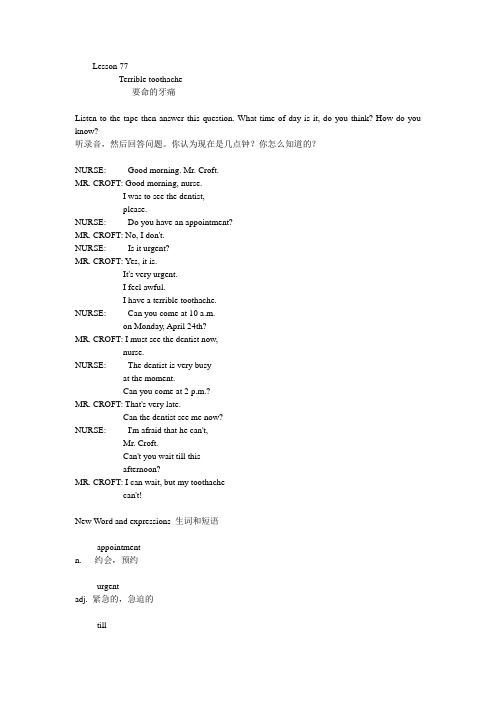
Lesson 77Terrible toothache要命的牙痛Listen to the tape then answer this question. What time of day is it, do you think? How do you know?听录音,然后回答问题。
你认为现在是几点钟?你怎么知道的?NURSE: Good morning. Mr. Croft.MR. CROFT: Good morning, nurse.I was to see the dentist,please.NURSE: Do you have an appointment?MR. CROFT: No, I don't.NURSE: Is it urgent?MR. CROFT: Yes, it is.It's very urgent.I feel awful.I have a terrible toothache.NURSE: Can you come at 10 a.m.on Monday, April 24th?MR. CROFT: I must see the dentist now,nurse.NURSE: The dentist is very busyat the moment.Can you come at 2 p.m.?MR. CROFT: That's very late.Can the dentist see me now?NURSE: I'm afraid that he can't,Mr. Croft.Can't you wait till thisafternoon?MR. CROFT: I can wait, but my toothachecan't!New Word and expressions 生词和短语appointmentn. 约会,预约urgentadj. 紧急的,急迫的tillprep.直到……为止参考译文护士:早上好,克罗夫特先生。
新概念一册77课

3.Can you come at 10 a.m. on Monday, April 24th? 您在 4 月24日星期一上午10点钟来可以吗? 【注释】英语中的时间次序一般是由小到大。 【例句】 在1988年7月2日 on July 2nd, 1988 在 1989年 6月 3日 7点 at seven on June 3rd, 1989 4. Can't you wait till this afternoon? 您就不能等到 今天下午了吗? 【分析】情态助动词的否定疑问句形式,表示请 求。 →肯定疑问式 : Can you wait till this afternoon?
Q:
1. What's the matter with Mr.Croft? 2.Can the dentist see Mr. Croft now?
★Notes: 1.I want to see the dentist, please.我想见牙科医 生。 【注释】want to see sb. 想见某人 【例句】我想见见你的家人。 I want to see your family. 2. Do you have an appointment ? 您约好了吗? 【注释】have an appointment(with sb.) (与某人)有约会 【例句】我已约定下午3点去看牙医。 I have an appointment with my dentist at 3 p.m.
★NewWords:
appointment n.约会,预约 till prep.直到...为止 urgent adj.紧急的,急迫的
★Word study 1. appointment n. 约会;预约: I made an appointment with Mike last Tuesday. 我上周二和迈克约好见面。
新概念英语第一册第77课
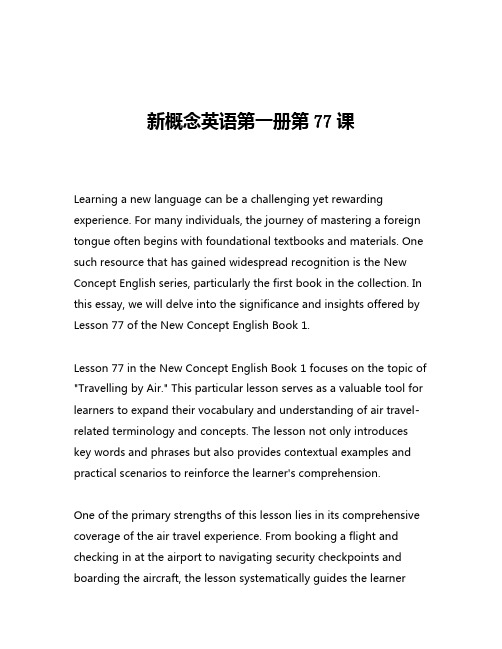
新概念英语第一册第77课Learning a new language can be a challenging yet rewarding experience. For many individuals, the journey of mastering a foreign tongue often begins with foundational textbooks and materials. One such resource that has gained widespread recognition is the New Concept English series, particularly the first book in the collection. In this essay, we will delve into the significance and insights offered by Lesson 77 of the New Concept English Book 1.Lesson 77 in the New Concept English Book 1 focuses on the topic of "Travelling by Air." This particular lesson serves as a valuable tool for learners to expand their vocabulary and understanding of air travel-related terminology and concepts. The lesson not only introduces key words and phrases but also provides contextual examples and practical scenarios to reinforce the learner's comprehension.One of the primary strengths of this lesson lies in its comprehensive coverage of the air travel experience. From booking a flight and checking in at the airport to navigating security checkpoints and boarding the aircraft, the lesson systematically guides the learnerthrough the various stages of the journey. This holistic approach ensures that students gain a well-rounded understanding of the processes and procedures involved in air travel.Moreover, the lesson delves into the specific language used in air travel contexts. Learners are introduced to terms such as "departure," "arrival," "baggage claim," "boarding pass," and "customs," among others. By familiarizing themselves with these industry-specific vocabularies, students can better communicate and interact with airport staff, airline personnel, and fellow travelers during their air travel experiences.Beyond the practical aspects of air travel, Lesson 77 also touches on important cultural and social considerations. For instance, the lesson explores the etiquette and expectations surrounding air travel, such as the importance of arriving at the airport on time, following instructions from airport authorities, and being considerate of fellow passengers. These insights not only enhance the learner's language proficiency but also foster a deeper understanding of the cultural norms and expectations associated with air travel.One of the unique features of this lesson is its emphasis on real-world scenarios and dialogues. The lesson presents various conversational exchanges that commonly occur during air travel, such as interactions with check-in agents, security personnel, andflight attendants. By exposing learners to these authentic interactions, the lesson helps them develop the necessary listening and speaking skills to navigate similar situations confidently.Furthermore, the lesson includes a range of engaging exercises and activities to reinforce the learned concepts. These activities may include vocabulary matching, sentence completion, and role-playing exercises, all of which provide learners with opportunities to actively apply their knowledge and improve their language skills.The significance of Lesson 77 in the New Concept English Book 1 extends beyond its immediate focus on air travel. By mastering the language and concepts presented in this lesson, learners can develop a stronger foundation for their overall English language proficiency. The skills and knowledge gained can be transferable to other travel-related contexts, such as booking accommodations, ordering meals, and engaging in conversations with locals.Moreover, the lesson's emphasis on practical, real-world scenarios aligns with the broader goals of the New Concept English series, which aims to equip learners with the necessary language skills to function effectively in various social and professional settings. By focusing on relevant and relatable topics, the series encourages learners to apply their language skills in authentic situations, ultimately enhancing their confidence and communication abilities.In conclusion, Lesson 77 of the New Concept English Book 1 is a valuable resource for individuals seeking to improve their English language skills, particularly in the context of air travel. The lesson's comprehensive coverage of air travel-related terminology, its emphasis on practical scenarios, and its focus on cultural awareness make it a compelling and effective tool for language learners. As part of the broader New Concept English series, this lesson contributes to the development of well-rounded English language proficiency, equipping learners with the necessary skills to navigate the global landscape with confidence.。
新概念英语第一册第77-78课:Terrible toothache
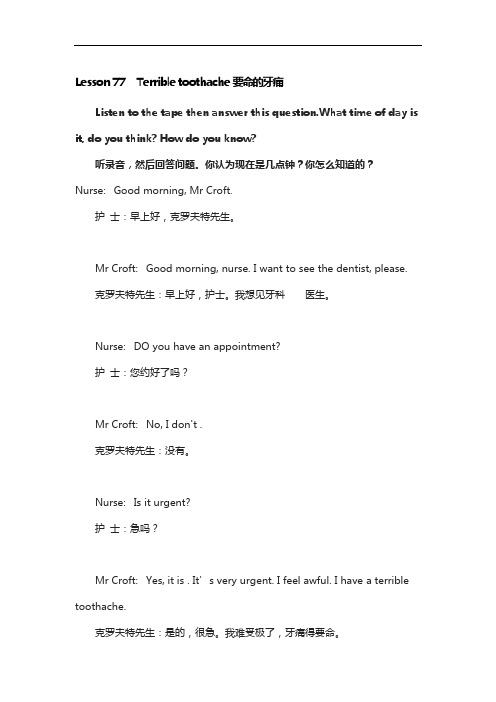
Lesson 77 Terrible toothache要命的牙痛Listen to the tape then answer this question.What time of day is it, do you think? How do you know?听录音,然后回答问题。
你认为现在是几点钟?你怎么知道的?Nurse: Good morning, Mr Croft.护士:早上好,克罗夫特先生。
Mr Croft: Good morning, nurse. I want to see the dentist, please.克罗夫特先生:早上好,护士。
我想见牙科医生。
Nurse: DO you have an appointment?护士:您约好了吗?Mr Croft: No, I don't .克罗夫特先生:没有。
Nurse: Is it urgent?护士:急吗?Mr Croft: Yes, it is . It’s very urgent. I feel awful. I have a terrible toothache.克罗夫特先生:是的,很急。
我难受极了,牙痛得要命。
Nurse: Can you come at 10 am on Monday, April 24th?护士:您在4月24日星期一上午10点钟来行吗?Mr Croft: I must see the dentist now, nurse.克罗夫特先生:我必须现在就见牙科医生,护士。
Nurse: The dentist is very busy at the moment. Can you come at 2:00 PM?护士:牙科医生这会儿很忙。
您下午两点钟来行吗?Mr Croft: That’s very late. Can’t the dentist see me now?克罗夫特先生:那就太晚了。
牙科医生现在就不能给我看一下吗?Nurse: I’m afraid that he can’t , Mr Croft. Can’t you wait till this afternoon?护士:恐怕不能,克罗夫特先生。
新概念英语-第一册-Lesson+77课件

eg. Didn't you know? 难道你不知道吗? Aren't you a student? 难道你不是学生吗?
回答: 否定疑问句的答语在形式上与一般疑问句的答语一样,肯定是Yes,否
定为No。但翻译成汉语时,Yes要翻译成“不” ,No要翻译成“对,是 的”。
The text
NURSE: Is it urgent? MR. CROFT: Yes, it is. It's very urgent. I feel awful.
I have a terrible toothache. NURSE: Can you come at 10 a.m. on Monday, April 24th? MR. CROFT: I must see the dentist now, nurse.
课堂练习
三、 用所给动词的适当形式填空(10分) 1. Mr. Croft wants ___________ (see) the doctor. 2. It is urgent for me ___________ (have) an appointment with him. 3. They are not going back to work until they ___________ (get) a lot of money. 4. The students are busy ___________ (listen) to the teacher. 5. The cat ___________ (jump) off the wall a minute ago. 6. My sister ___________ (buy) this pair last month. 7. He ___________ (speak) German. He was a tourist. 8. ___________ women always ___________ (wear) uncomfortable shoes? 9. The shoes like those ___________ (be) in fashion last year and the year before last. 10. He ___________ (go) to a town near the sea a short time ago.
(完整版)新概念英语77课讲义

Lesson77 Terrible toothache一、单词与短语appointment: n.约会,预约;make an appointment:约会;I made an appointment with Tom on Monday.星期一我跟汤姆约会了。
urgent:adj.急切的;紧急的;till:prep.直到、、、为止;掌握与till相近的一个短语:not、、、until:直到、、、才:I did not know the truth until I met her at school.直到在学校遇见她,我才知道事情的真相;Don’t get off the bus until it has stopped.车停稳了以后再下车。
You mustn’t eat anything until you see the doctor.看过医生之后,你才能吃东西。
not、、、until是英语中一个相当重要的句型,需要掌握!二、短语句型及语法1、Do you have an appointment? 你有预约吗?在本句中需要掌握的是appointment的用法:appointment是约会、预约的意思,在英语中应用地非常广泛,关于appointment需要掌握一个常见的重要短语:have an appointment with sb:和某人有个约会I will have an appointment with my classmate tomorrow.我明天跟同学有个约会。
2、Is it urgent? 紧急吗?Urgent是“紧急的”的意思,关于urgent需要掌握一个重要的句型即可:it is urgent for sb to do sth:对某人来说做、、、是非常紧急的,例:It is urgent for me to learn English.对我来说学英语是件紧急的事情。
It is urgent for me to be accustomed to the new environment.对我来说尽快适应新环境是件紧急的事情。
新概念英语第一册Lesson77-78课件
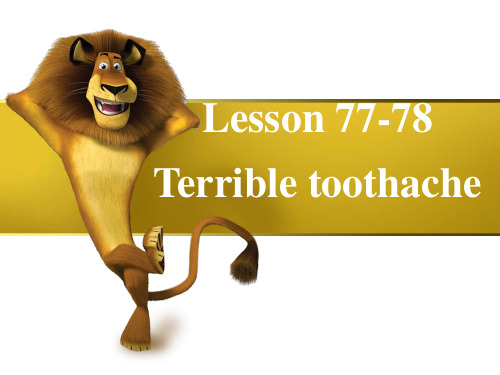
模仿例句回答以下问题,注意时间状语的变化 eg: It’s eight o’clock. When did you see him?
(half an hour ago) I saw him at half past seven. It’s Friday. When did she go to London? (the day before yesterday) She went to London on Wednesday. It’s June. When did Mr Jones buy that car? (last month) He bought that car in May.
Can 't you come at 2 a.m.?
Are n't you a boy?
Did n't you do your homework?
步
先变
be/助/情
骤
一般疑问句
后加not
1. I can play football. Can you play football?
Can't you play football?
She went to town yesterday. 1. She buys a new car every day.
She _b_o_u_g_h_t a new car last year. 2. She airs the room every day.
She _a_i_re_d__ it this morning.
NURSE: Do you _h__a_v_e_a__n__a_p_p_o_i_n_t_m__e_n_t__? MR. CROFT: No, I don’t. 有一个预约
新概念英语课件第77课

语言点
• I have a terrible toothache. 我得了严重的牙疼。
• terrible a. 很差的,糟糕的
例句:这是部糟糕的电影。 This is a terrible film.
语言点
• April 24th 4月24号 读作:April the 24th
• 序数词复习: first second third 第一 第二 第三
文化背景:
西方国家一般看病都不是去大医院,而去私 人医院,医生很忙需要接待很多病人,只能安 排好时间,按预约时刻去看病,其他时间一般 没办法看病。
词汇
• Urgent a. 紧急的,急迫的
搭配:紧急会议 urgent meeting
例句:我们有一件紧要的事情。 We have an urgent thing.
新概念英语一册 Lesson 77
Terrible toothache 牙疼不是病,一疼要人命
词汇
• appointment n. 预约 区别: date n. 约会
-ment n. 名词后缀 以ment结尾的词通常是名词。
语言点
• Do you have an appointment? 你有预约么?
• 7.I have a terrible toothache. • 变成一般疑问句 • Do you have a terrible toothache? • 8.I must see the dentist now, nurse. • 变成否定句 • I mustn’t /needn`t see the dentist now, nurse. • 8.The dentist is very busy at the moment. • 对红色部分提问 • Who is very busy at the moment? • 9.Can the dentist see me now?变成肯定句 • The dentist can see you now.
新概念第一册77-78课件

PPT学习交流
4
toothache
appointment nurse's advice
result
PPT学习交流
5
PPT学习交流
6
词汇
•appointment n. 预约 •区别: date n. 约会
-ment n. 名词后缀 以ment结尾的词通常是名词。
PPT学习交流
7
语言点
• Do you have an appointment? 你有预约么?
have an appointment with sb. 文化背景:
西方国家一般看病都不是去大医院,而去私人医院 ,医生很忙需要接待很多病人,只能安排好时间,按 预约时刻去看病,其他时间一般没办法看病。
PPT学习交流
8
语言点
•I have a terrible toothache. 我得了严重的牙疼。
Have:小强动词 可以表示很多“动词含义”
PPT学习交流
9
PPT学习交流
10
词汇
•urgent a. 紧急的,急迫的
搭配:紧急会议 urgent meeting
例句:我们有一件紧要的事情。 We have an urgent thing.
PPT学习交流
11
你难道不能等到今天下午吗?
Yes ,I can.ห้องสมุดไป่ตู้
I can wait till this afernoon.
No, I can’t.
I can’t wait till this afernoon.
PPT学习交流
新概念英语第一册Lesson77

★ appointment [ə'pɔɪntmənt]
n. 约会,预约
• have an appointment 有一个约会
你有约会吗? Do you have an appointment?
• make an appointment with sb 和某人有约
我和汤姆有个约会。 I have an appointment with Tom.
勇于开始,才能找到成 功的路
Can you come at 2 p.m.?
勇于开始,才能找到成 功的路
• Nurse:Can you come at 10 a.m. on Monday April
24th?
• Mr. Croft:I must see the dentist now, nurse.
I want to see the dentist, please.
勇于开始,才能找到成 功的路
Do you have an appointment?
勇于开始,才能找到成 功的路
No, I don’t.
勇于开始,才能找到成 功的路
want to do sth. want sth.
Nurse:Good morning, Mr. Croft.
Is it urgent? 很急么? 这句话,一般常用于医院,买票, 排队等情况。 I feel awful. 我觉得很糟糕。 感官动词 + 形容词
feel awful
2020/9/21
3.I have a terrible toothache. 我得了严重的牙疼。
• terrible • a. 很差的,糟糕的 这是部糟糕的电影 This is a terrible film.
新概念第一册第77课

5
Listen
to the tape and answer the question: What time of the day is it? 077&078-Terrible Toothache.mp3
6
Appointment Urgent Till dentist
7
1. I want to see the dentist, please.
21
复习in,on,at的用法:
【in】是“大姐”,因为后面所接的都是较长时 间(月、年、季节等)。 【on】是 “二姐”,后面所接的时间多与日期 有关(星期几、日期等)。 【at】是“小妹”,因为接在后面的时间最短( 具体时刻或某短暂时间)。
22
七点半
When did you see him? I saw him at half past seven.
I’m afraid that+句子 表示否定,不是真的害怕, 而是语气婉转。
12
I am afraid that I can't come tonight. 恐怕今天晚上我不能来了 I‘m afraid that it is going to rain tomorrow. 我担心明天会下雨。
恐怕牙医现在不能见你.
Can’t you wait __________________till this afternoon? 您就不能等到今天下午吗?
19
goes ( go) to town every day. She ______ went (go)to town yesterday. She ______
新概念第一册Lesson77分析解析
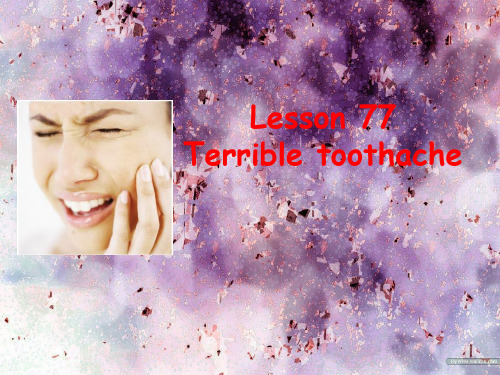
在这生死攸关的时刻,当地的印第安人为他 们送去了食物、生活用品和生产工具,帮助他们 建立了新家园。为感谢在危难之时帮助、支援过 他们的印第安人,同时也感谢上帝对他们的“恩 赐”,他们将猎获的火鸡制成美味佳肴,盛情款 待印第安人。感恩节吃火鸡的习俗便流传下来了。
感恩节食物--南瓜馅饼
• 最吸引人的大菜南瓜馅饼(pumpkin pie)
3.I have a terrible toothache. 我得了严重的牙疼。 • terrible • a. 很差的,糟糕的 This is a terrible film. 这是部糟糕的电影
2018/10/20
• Nurse:Can you come at 10 a.m. on Monday April 24th? • Mr. Croft:I must see the dentist now, nurse. • Nurse:The dentist is very busy at the moment. Can you come at 2 p.m.?
Lesson 78 When did you ...?
你什么时候...?
2018/10/20
1.复习时间表达法口诀:
时间顺读时后分, 时间逆读分后时。 三十以内past连, 三十以后to中间。 分用六十减放前, 时后加一不能欠。
2.复习in,on,at的用法:
【in】是“大姐”,因为后面所接的都是较长时 间(月、年、季节等)。 【on】是 “二姐”,后面所接的时间多与日期有 关(星期、日期、具体时间、纪念日等)。 【at】是“小妹”,因为接在后面的时间最短 (具体时刻或某短暂时间)。
• • • • • • • • • • • •
1.I want to see the dentist , please. 对红色部分提问 What do you want to do? 2.Do you have an appointment? 变成肯定句 I have an appointment. 3.Is it urgent ?变成肯定句 It is urgent. 4.It‘s very urgent. 变成一般疑问句 Is it very urgent? 5.I feel awful.对红色部分提问 How do you feel?
新概念第一册第77课Lesson-77-78TERRIBLETOOTHACHE

• I want to see the dentist, please.
• N: Do you have an appointment?
• Mr.: No, I don't.
• N: Is it urgent?
• Mr.: Yes, it is. It's very urgent.
• I feel awful.
每个人都和死神有约定
• Urgent numbers: • 110, • 119, • 911,
120, • 122, • 144,
April 24th 星期一上午10点
Week:
on Sunday; Monday; Tuesday; Thursday;
Friday; Saturday; Sunday
? What is the same
• 9月12日星期六下午3点 • at three,on September 12nd • 年8月13日星期二下午1点半 • at one ,on Sunday April the thirteenth. • 3月28日星期日上午6点55 • at six fifty-five ,on Sunday March 28th.
• Must ,情态动词预期强烈。必须,
• A dictionary is a must for English learners. • 必不可少的
• • At the • 。
moment, this moment , this minute
否定疑问句
I’m afraid,+ 宾语从句。
• 感观动词:
• not until 表示“直到(某时)(某动作)才(发 生)”
• 如果将 "not until …"的结构放在句首,那么主句 要写成倒装句。
新概念1第77课

armache 胳膊疼
legache
腿疼
Passage Explaination(课文讲解)
Q:What time of day is it, do you think?How do you know?
你认为现在是几点钟?你怎么知道的?
New words and expressions(生词和短语)
They danced till midnight.
他们一直跳舞到半晚。
Grammar(重点语法)
1. I want to see the dentist. want to do sth. 想要做某事 eg. I want to play computer games. 我想要玩电脑游戏。 want sb. to do sth. 想要某人做某事 eg. My mother wants me to go abroad. 我妈想让我出国。
地点:I lived in Wuhan City, Hubei Province, China.
我住在中国湖北省武汉市
序数词:
第一:first
第二:second
第三:third
第四: fourth
第五: fifth 第六: sixth
第七: seventh 第八: eighth
第九: ninth 第十: tenth
appointment n. 约会,预约 urgent adj. 紧急的,急迫的
till prep.直到……为止 toothache dentist awful terrible
NURSE: Good morning. Mr. Croft. MR. CROFT: Good morning, nurse. I want to see the dentist, please. NURSE: Do you have an appointment? MR. CROFT: No, I don't. NURSE: Is it urgent? MR. CROFT: Yes, it is. It's very urgent.
新概念英语第一册Lesson-77课件

What’s the matter with him/ her? He/ she has a/an... What must he/ she do? He/ She must...
New words
• appointment [əˈpɔɪntmənt] • urgent [ˈəːdʒənt] • till [tɪl]
Can you come at 2 p.m.?
MR. CROFT: That's very la9te. Can the dentist see me now?
NURSE:
I'm afraid that he can't, Mr. Croft.
Ca1n0't you wait till this afternoon?
பைடு நூலகம்
n. 约会,预约 adj. 紧急的,急迫的 prep. 直至…为止
Watch and answer : ●What time of day is it, do you think? How do you know?
Listen and fill in the
blanks
NURSE:
Good morning. Mr. Croft.
I have a terrible toothache.
NURSE:
Can you come at 150 a.m. on Mon6day, Apri7l 24th?
MR. CROFT: I must see the dentist now, nurse.
NURSE:
The dentist is very busy at the 8moment.
Lesson77+Terrible+toothache(课件)新概念英语第一册+
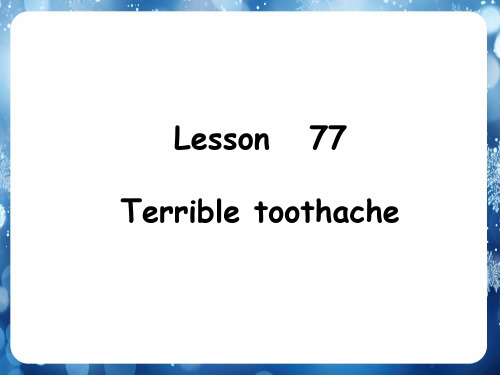
Lesson 77 Terrible toothache
Hello my dear students. Today I’m very happy to see you again. Because I got a bad toothache last week. I thought I was going to die. I’m afraid I can’t see you today. Then I went to see a dentist. I’m all right now. But there was something wrong at the dentist’s waiting room at the beginning, because I didn’t make an
3. It is very u_rg_e_n_t_ for Mr. Croft to see the dentist because he has an awful toothache.
4. Can’t you w_a_it_ till this afternoon? 5. Se_p_t_e_m_b_e_r_ is the ninth month of the year. 6. She came to see me two days ag_o_.
